
The rise of the Hohenzollerns, 1192-1399: A mega campaign beginning CK2 AAR
- Thread starter Avindian
- Start date
-
We have updated our Community Code of Conduct. Please read through the new rules for the forum that are an integral part of Paradox Interactive’s User Agreement.
You are using an out of date browser. It may not display this or other websites correctly.
You should upgrade or use an alternative browser.
You should upgrade or use an alternative browser.
1381
1370
Alea iacta est.
Died in 1372?
I'm going to guess he dies in 1377.
Which is such a nice and even number
One of you has gotten it right! But which one?
The one I'm PMing now.
Chapter 25: A new era of Hohenzollern greatness begins?
16 February 1365, Ulm
Reinhard von Hohenzollern sat in front of the pond, lost in thought. It was no secret that his father, although healthy, was growing noticeably more pallid by the day. With Gebhard becoming the King of France, as his wife inherited the throne, Max had nobody to help administer the realm except his son. Reinhard knew he was ready, and indeed, was eager for the opportunity to prove himself. Shortly after his 16th birthday (and Gebhard's coronation), Reinhard was named Marshal of Bayern, but the heir to the throne knew he needed more.
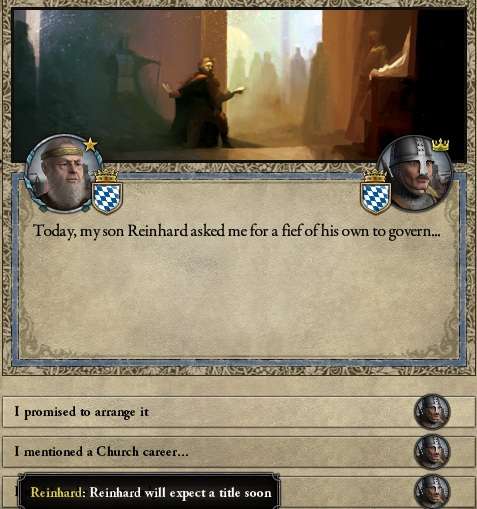
More than anything, Reinhard needed the experience of being a noble, and he needed it fast. Max was initially hesitant to give his son so much responsibility, but in the end he consented. Reinhard became Graf von Ulm.
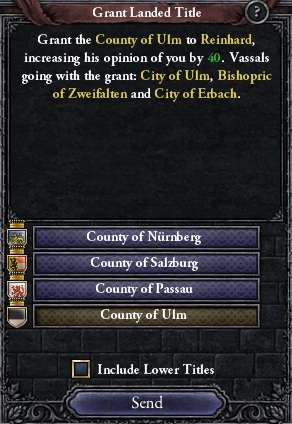
One of the things Max most wanted for his son was a stable realm; two more claimants for the Duchy of Schwaben were politely but firmly rejected. Reinhard argued time and again that only a bloodbath would cleanse the nation, but Max wouldn't have it. In time, Reinhard came to agree with his father.
At least for the moment.
21 July 1365, the road to Bamberg
Reinhard came to regret his decision to accept his father's reluctance. Max had carefully distributed key titles like Master of the Hunt and Cupbearer to upset nobles, hoping to mollify them. Then, out of the blue, Max decided to increase the tax rates on all Bavarian nobles. They agreed, but quiet dissension slowly became open rebellion.
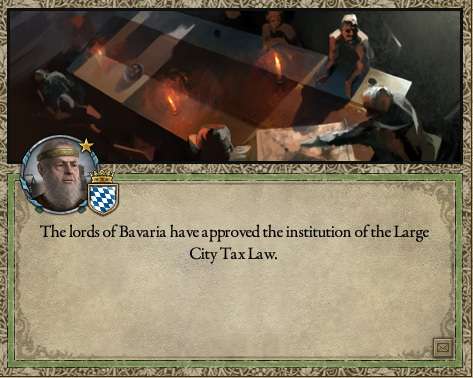
The ringleader of the movement was the Prince-Archbishop of Köln. He'd gathered a number of nobles who'd had cause to hate the Hohenzollerns for one reason or another. Herzog von Österreich Theodorich II feared Max's power (and had even suspected Max of trying to clandestinely build support to take his Duchy; rightly, as it turned out). Graf von Grisons Ordulf had tangled with the Hohenzollerns in the past; for him it was personal. Thinking Max had weakened in his advancing age, the Archbishop sent Max an ultimatum.
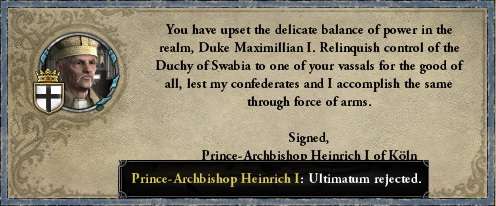
When the Archbishop's offer was refused, he declared war on the Hohenzollerns. Reinhard would have to do his duty as Marshal and put down the rebellion. Sune, a distant cousin, would take the center column, while King Gebhard took the left. There were angry rumblings in France that the Queen had usurped the throne and worse, would hand it over to filthy foreigners, so the King found a strategic withdrawal to the battlefield a welcome distraction.
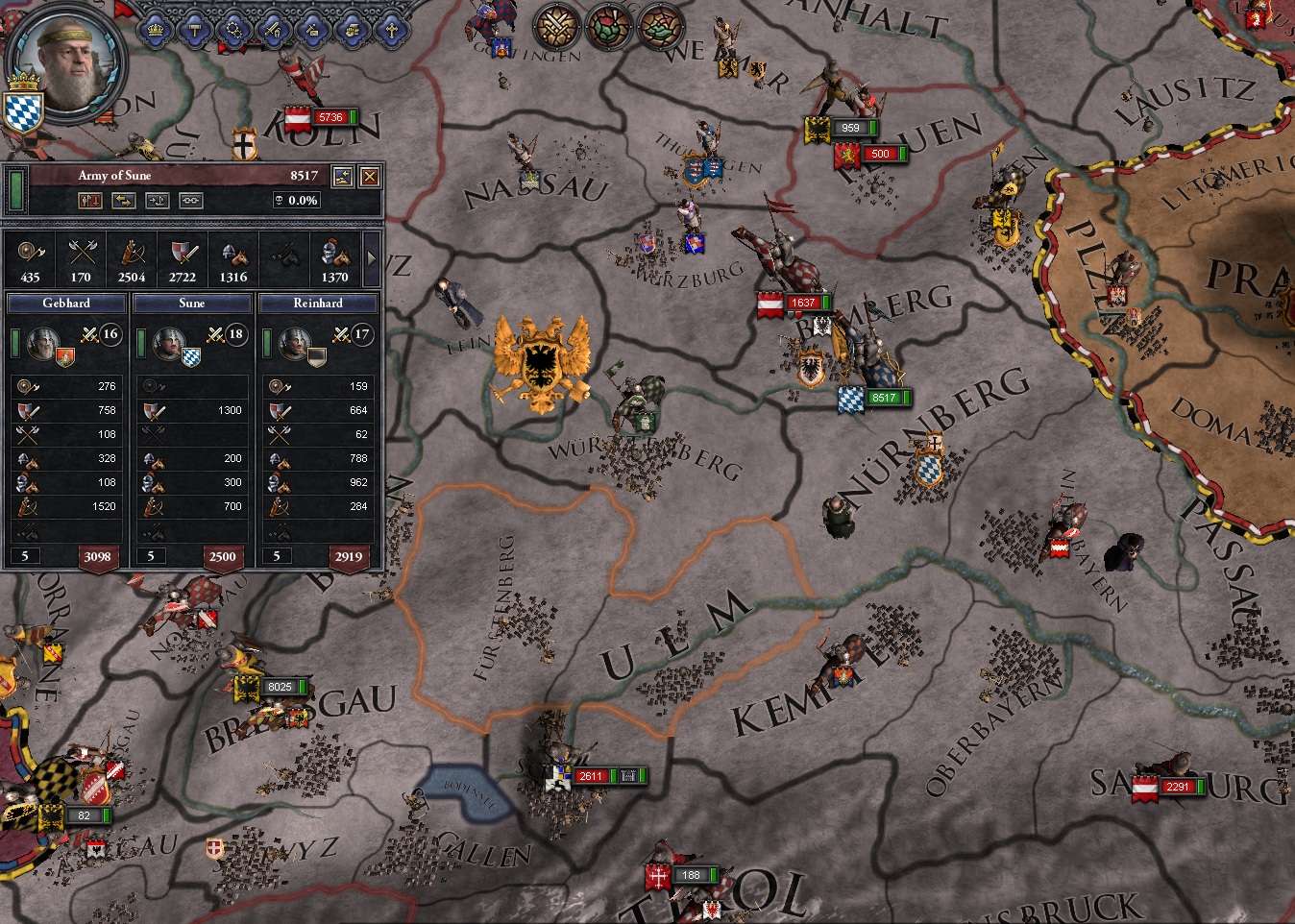
What was Max doing? Something very shocking for a man of his age.
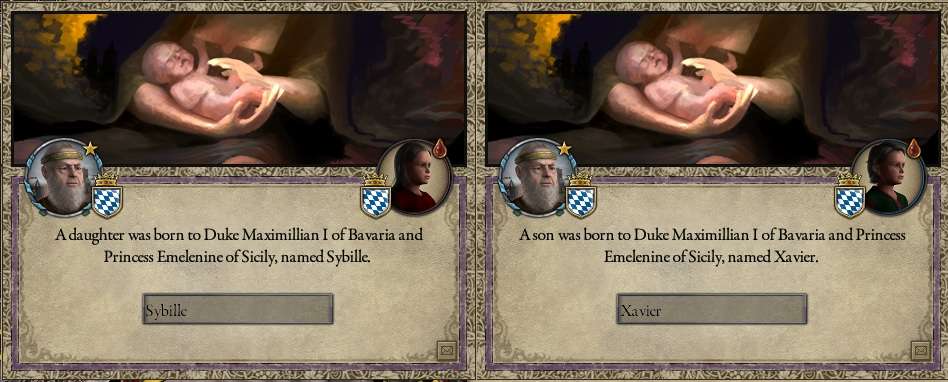
Raising two new infant twins.
25 March 1366, Zollern
Maximillian von Hohenzollern, unfortunately, didn't get to spend as much time as he would have liked with his new children. A surprise invasion by a huge force of Kölners required the raising of all levies in the realm. Qualified commanders were in short supply and, at 58 years old, Max was forced to return to the field.
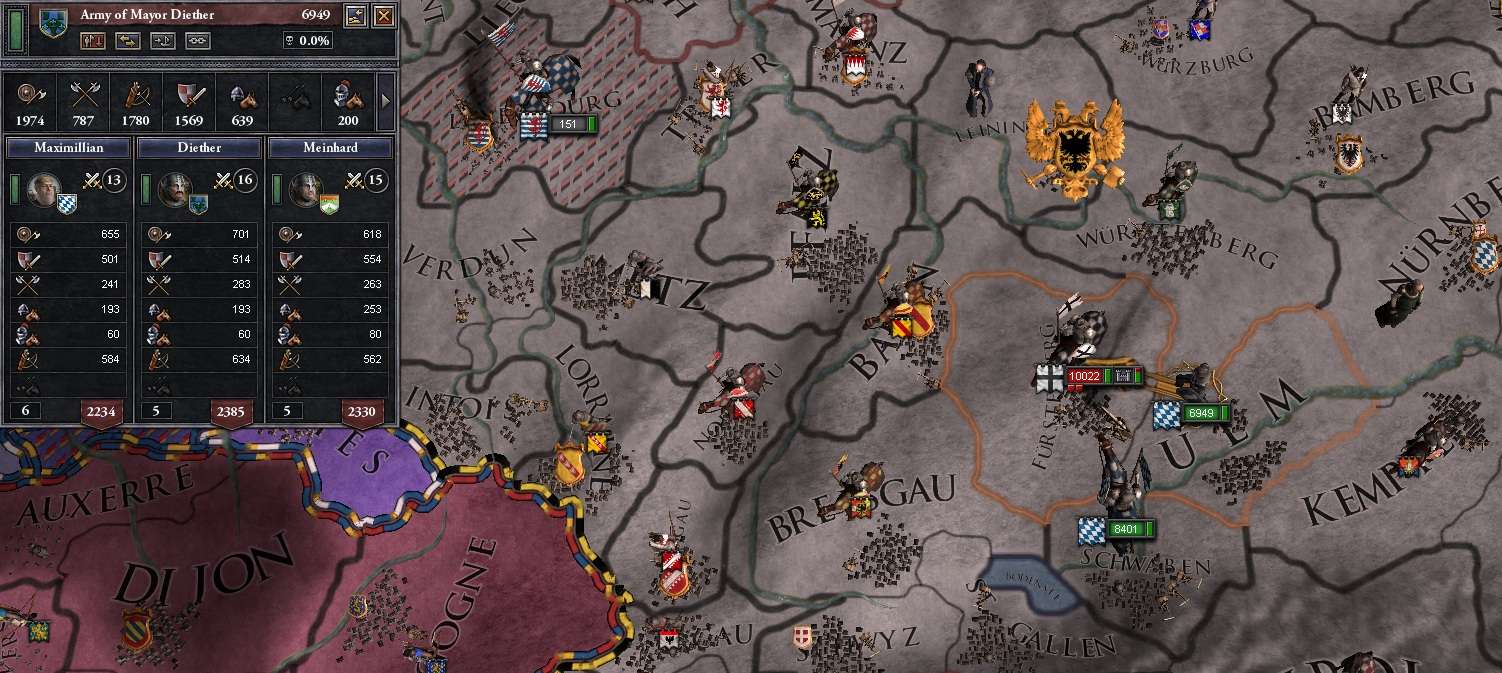
The overall plan was to trap the enemy force with the faster army of Reinhard, who would hold the field until reinforcements could arrive in the person of Max and his men. Max hoped that the Archbishop would see reason and surrender if the day was won. To Max's great surprise, however, the Archbishop had some very unsavory allies.
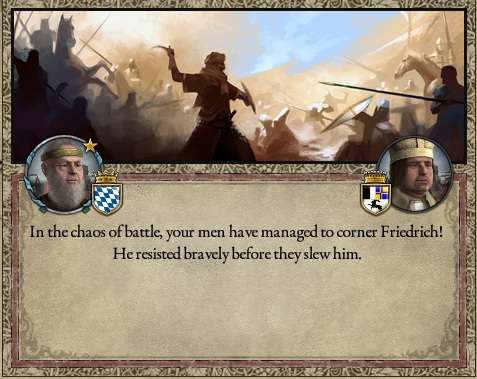
The Wittelsbachs continued to plague Hohenzollern steps, even when they had little power. All of a sudden, Max realized why the Archbishop was so tough: he had the the backing of men who wanted nothing more than the complete annihilation of the Hohenzollerns. With the enemy commander slain, though, the forces at Zollern had no choice but to retreat. The ancestral home of the Hohenzollerns was safe again.
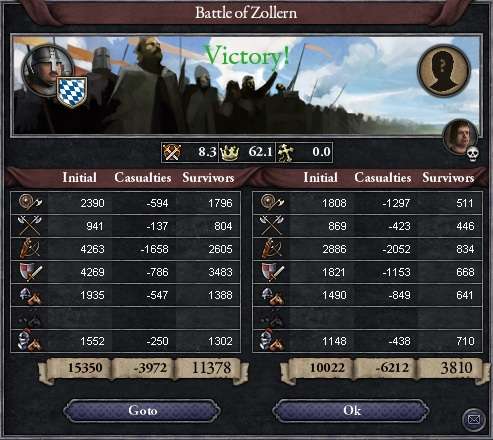
The Archbishop, however, had escaped easily in the ruckus. He'd holed himself up in his fortress in Köln. The message was clear: the Hohenzollerns would have to force him out.
9 November 1366, Bern, Schwyz
"Mais oui, Madame Comtesse. I will tell him you appreciated the gift and I will convey your acceptance of the agreement." With those words, Chancellor Robert Capet shifted the balance of power in the favor of the Hohenzollerns.
The defeat of the enemy army at Hirsau still wasn't enough to incur a peace. Max knew that a long siege might allow his opponents back in Nürnberg to scheme, so he'd instructed Robert to find allies. His best opportunity was to convince the Grafin von Schwyz, Konstanze, to join the war effort. It was a perfect idea, especially since she was Reinhard's wife. Max had originally intended to go himself, but knew that Konstanze was a cagey woman and would strike a very hard bargain. Max found himself losing the appetite for negotiation (particularly backroom deals) that he once had, and so sent Robert instead.
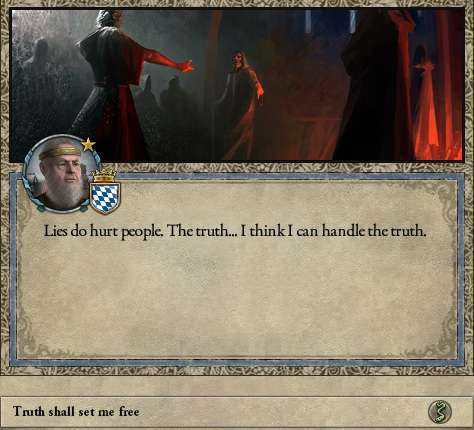
Konstanze, in truth, did not want for much. After all, her husband was going to hold two Duchies, one of which was directly under attack. Their children could potentially add the County of Schwyz to their already impressive legacy, at least in theory. Yet at the same time, Konstanze did not want to appear weak or spineless. She had to get something to prove to her subjects that she was not doing this solely out of family loyalty. A bribe of 67 thalers was sufficient to convince most of her nobility to support the plan, and she happily agreed to send her armies under the Hohenzollern banner.
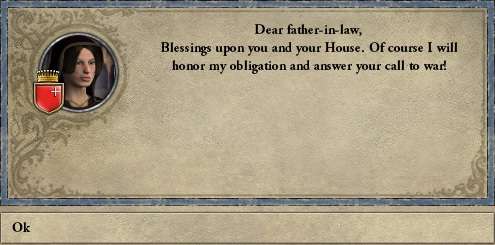
This was especially critical news because the second army had been disbanded, to prevent the nobility from getting too angry. Although the short war Reinhard and Max had hoped for was no longer a possibility, victory was still well within their grasp.
20 August 1369, Köln
Signing the treaty with the Swiss turned out to be Robert's last official act as Chancellor. Max's son-in-law, Orderic of Sicily, turned out to be an absolute diplomatic genius. Robert was given the retirement he so richly deserved and a sizable pension from a grateful Herzog.
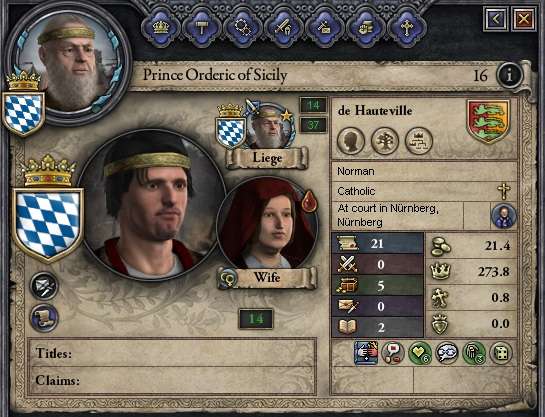
Yet for there to be peace, Marshal Reinhard needed to press the attack. Grimhilde, Max's daughter, was sent to learn from her sister Gerlinde (where she would be away from any serious fighting). Both were visiting Orderic's parents in Sicily, which eased Max's mind. Dietz fell in 1367, but Berg proved even more difficult to take. This was odd, as the Baron of Berg had been captured by Hohenzollerns earlier, yet despite his imprisonment, the Baron would not negotiate a surrender. Gebhard had jail problems of his own, with his wife Catherine being imprisoned by the new King of France, Robert III.
Reinhard's infant son, Maximillian, was in Nürnberg with his grandfather and aunt Sybille; Sybille was busily teaching her nephew the importance of diligence as she learned from her father.
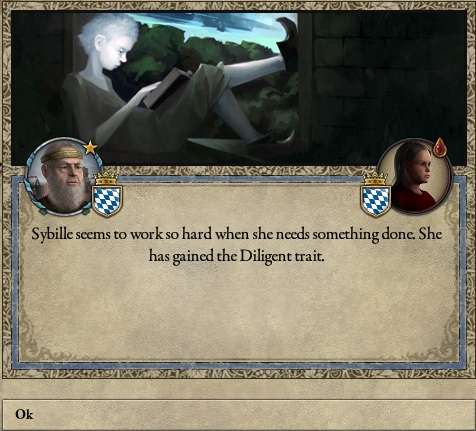
Knowing his wife and child were safe allowed the Marshal to turn his full attention to taking the enemy castle at Berg; a sally attempt at Tübingen was easily repulsed, and with no relief coming, Berg finally surrendered.
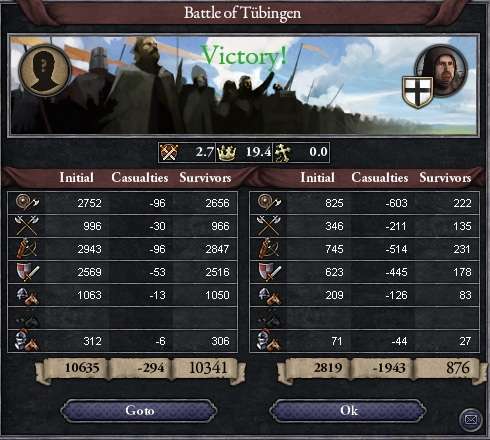
It was now up to Chancellor Orderic to get the formal surrender from the Archbishop of Köln, as well as to drag him back in chains.
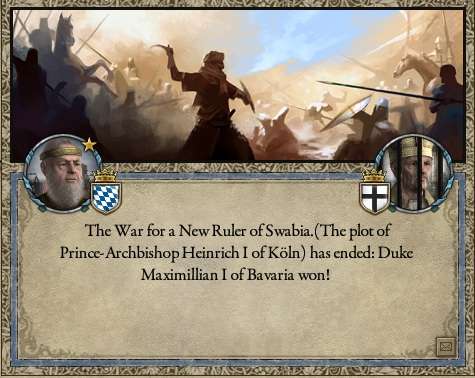
Reinhard was immensely satisfied with his first victory; Chancellor Orderic was pleased with his first successful treaty. Neither knew that Reinhard's first victory would be Max's last.
27 December 1370, Nürnberg
Max's final days on earth were relatively quiet and peaceful. He'd contracted a fever while on campaign, and he slowly grew weaker and weaker. Max tried, in vain, to convince Kaiser Christopher to strip the Duchy of Holland from Theodorich II von Österreich. Instead, his plan backfired. The Kaiser failed to get any concessions and even found himself replaced by the Duke of Pisa.

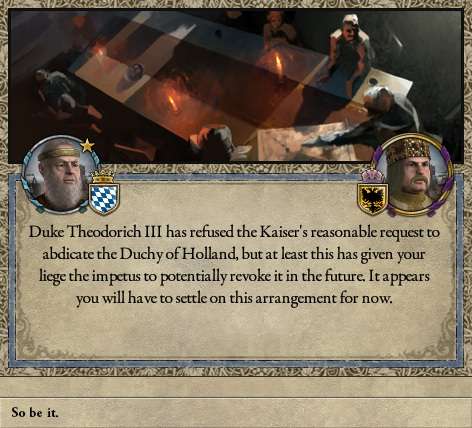
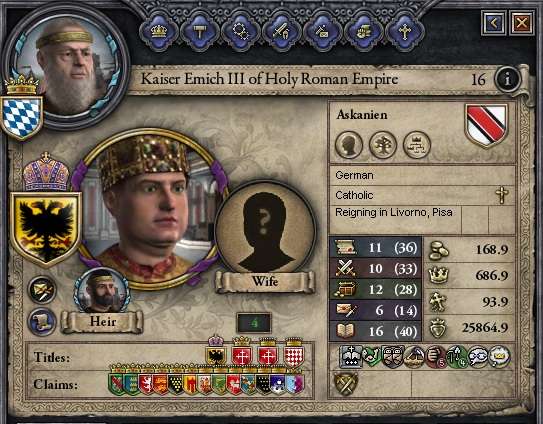
Disappointed that his plan had failed, Max spent the rest of his short time with his children, imparting a lesson of trustfulness on Xavier.
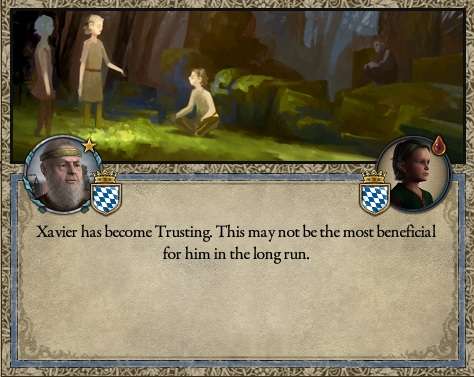
But when Max died, there was not one funeral but two. Gerhard, Max's nephew, had tried desperately to get Max to forgive his earlier crimes. For the Pope to formally grant Gerhard forgiveness of his sins, Gerhard needed the permission of his liege. When Max passed away from his illness, Gerhard realized he'd be permanently condemned to Hell. The stress caused a stroke, and Gerhard died within minutes of Max.

The new Herzog, Reinhard, quietly asked the Pope to pray for Gerhard.
But even more quietly, he asked for a prayer for himself.
I'm now completely caught up with where I stopped playing before. I want to finish the Netherlands AAR (and some other stuff) before I play CKII some more, so there'll be about a week or 10 days in which I don't update here. Rest assured, I will finish this and move on to Part 2 of this Megacampaign!
I don't know about anyone else but I'm willing to be patient for a while.
Am I the only one who kept mixing up Count Gerhard and Prince-Consort Gebhard? Will that accursed archbishop rot in the dungeons or will he be released to either prove Reinhard's magnanimity or boost the Duchy's coffers?
Am I the only one who kept mixing up Count Gerhard and Prince-Consort Gebhard? Will that accursed archbishop rot in the dungeons or will he be released to either prove Reinhard's magnanimity or boost the Duchy's coffers?
I don't know about anyone else but I'm willing to be patient for a while.
Am I the only one who kept mixing up Count Gerhard and Prince-Consort Gebhard? Will that accursed archbishop rot in the dungeons or will he be released to either prove Reinhard's magnanimity or boost the Duchy's coffers?
No, you aren't. It was a pain to remember which name I was typing.
Does this game have some kind of naming script that looks at ancestors to decide a child's name?
And indeed, the gerbherds are very difficult to distinguish from each other.
And indeed, the gerbherds are very difficult to distinguish from each other.
Does this game have some kind of naming script that looks at ancestors to decide a child's name?
And indeed, the gerbherds are very difficult to distinguish from each other.
This might have something to it, because when I play Savoy I always name my kids Victor Emmanuel or preferably Victor Amedeé, and after a couple generations, these names start showing up by default.
It does. Each newborn child's default name is generated from their grandparents or other ancestors, and if there aren't (two parentless characters), you get default names from the culture script.
My guess based on the variables I've seen in the cultures file (where the names are) is that there's a # in 100 chance of the child being named after their parents, either grandparent, or at random.
Does this game have some kind of naming script that looks at ancestors to decide a child's name?
And indeed, the gerbherds are very difficult to distinguish from each other.
This might have something to it, because when I play Savoy I always name my kids Victor Emmanuel or preferably Victor Amedeé, and after a couple generations, these names start showing up by default.
It does. Each newborn child's default name is generated from their grandparents or other ancestors, and if there aren't (two parentless characters), you get default names from the culture script.
My guess based on the variables I've seen in the cultures file (where the names are) is that there's a # in 100 chance of the child being named after their parents, either grandparent, or at random.
I'd never noticed it, but you guys might be right.
Go, Leopold!

Who knows how big a role he'll have in the weeks to come?
So, I've played to the end of the game (this AAR will end six days before EU3, because I didn't want to overshoot the date.  ) I've already converted the save, and it looks like things are in great shape. We're looking at probably two to three updates left, plus a wrap-up update. The AAR should resume updates early next week -- Tuesday or Wednesday, in all likelihood. One thing I can tell you is that not all the characters got used; those that did not will be the first in the new AAR. I'm committing to, at the very least, carrying this up to HOI3. If it goes into HOI3 depends entirely on the state of the converters available.
) I've already converted the save, and it looks like things are in great shape. We're looking at probably two to three updates left, plus a wrap-up update. The AAR should resume updates early next week -- Tuesday or Wednesday, in all likelihood. One thing I can tell you is that not all the characters got used; those that did not will be the first in the new AAR. I'm committing to, at the very least, carrying this up to HOI3. If it goes into HOI3 depends entirely on the state of the converters available.
So, I've played to the end of the game (this AAR will end six days before EU3, because I didn't want to overshoot the date.) I've already converted the save, and it looks like things are in great shape. We're looking at probably two to three updates left, plus a wrap-up update. The AAR should resume updates early next week -- Tuesday or Wednesday, in all likelihood. One thing I can tell you is that not all the characters got used; those that did not will be the first in the new AAR. I'm committing to, at the very least, carrying this up to HOI3. If it goes into HOI3 depends entirely on the state of the converters available.
Nice to hear!
EU doesn't have characters the way CK2 has them, right? Are you planning to change the style of the AAR?
Are you planning to set "Random lucky nations" or "no lucky nations" in EU3 Avindian? I think that "historical lucky nations" isn't possible because of well-known reasons 
Nice to hear!
EU doesn't have characters the way CK2 has them, right? Are you planning to change the style of the AAR?
If you have a long time, check out my Novum Romanum Imperium AAR in my inkwell. There are some characters, but for the most part I make them up (or, to be more accurate, you do.
Are you planning to set "Random lucky nations" or "no lucky nations" in EU3 Avindian? I think that "historical lucky nations" isn't possible because of well-known reasons
I generally play with no lucky nations, and see no reason I would change my mind this time.
Since I got EU 3 for free and didn't try it yet since it looks so difficult, I have a question concerning the conversion: Will you be playing as Bavaria in EU or will you play as Nürnberg? Or will this converter remodel history in a way that it resembles the European map of CK2 in EU3?

